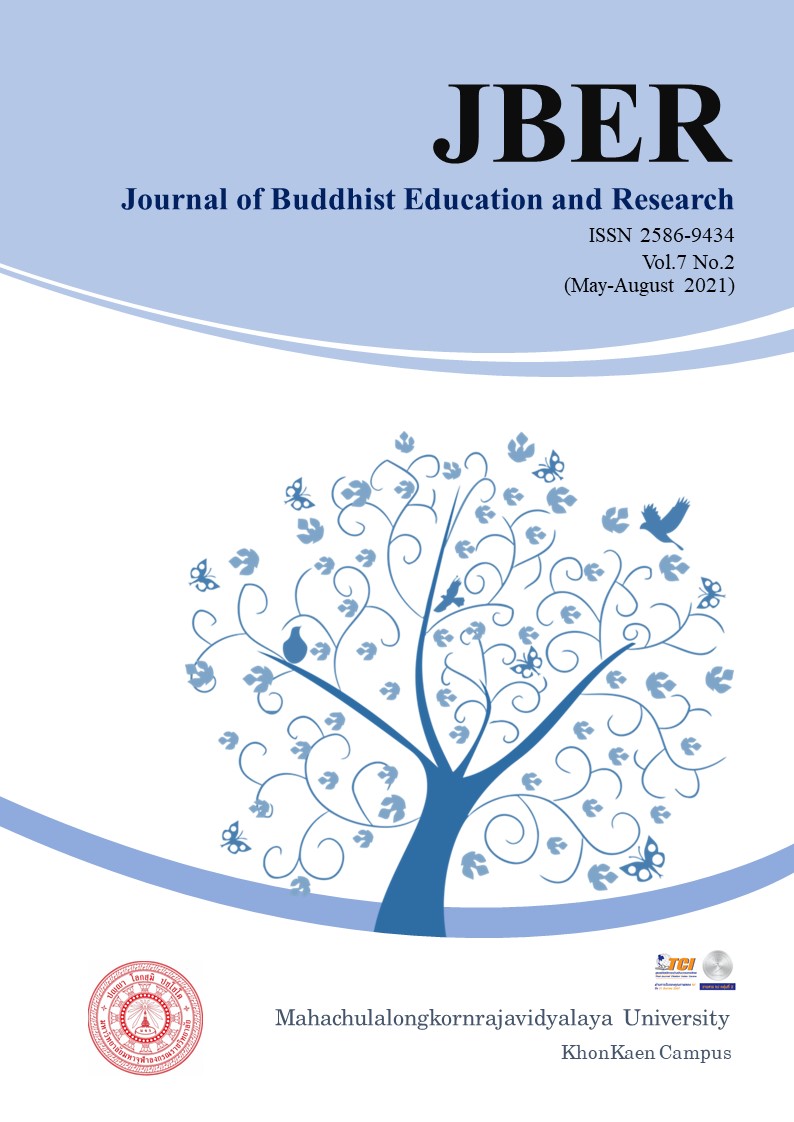THE ADMINISTRATION OF QUALITY STANDARDS ACCORDING TO FOURFOLD SANGHAVATTHU OF PHAPARIYATTIDHAMA SCHOOL IN THE DEPARTMENT OF ECCLESIASTICAL GENERAL EDUCATION UNDER THE OFFICE OF NATIONAL BUDDHISM, LOEI PROVINCE
Keywords:
Administration and Management; Sangkhahawatthu Fourfold; Educational Quality StandardsAbstract
The objectives of this research were: 1) to study the process of administration according to the quality standards, 2) the administration and management according to the quality standards by using the Four Saṅgahavatthu Dhammas; 3) present the guideline for the administration and management according to the quality standards by using the Four Saṅgahavatthu Dhammas of Phrapariyattidhamma Schools, General Education, Loei Province. The samples of this research included 194 informants: administrators, committee members, teachers, staff, community leaders and student council committee of Phrapariyattidhamma Schools, General Education, selected by Taro Yamane method. The tools used for data collection were questionnaires and the statistics used in the da analysis were: Percentage, Mean, Standard Deviation and the Pearson Correlation Coefficient.
The results of the research were as follows:
1) the overall attitude towards the administrative process and institutional management of the school administrators was at the highest level. The aspect with the highest rated mean was seen in that of ‘planning and setting up the physical and social environment conducive to the quality learning management’; 2) the overall mean score of the attitude towards the administration and management according to the educational standards by using the Four Saṅgahavatthu Dhammas was at the highest level. The highest mean score was seen in the aspect of Piyavācā (Kindly Speech); 3) the guideline for the administration and management according to the quality standards by using the Four Saṅgahavatthu Dhammas is that the administrators should give priority to the participation of all stakeholders and should apply the Four Saṅgahavatthu Dhammas to propel the administrative process and management based on the quality standards.
References
กมล ภู่ประเสริฐ. (2545). การบริหารงานวิชาการในสถานศึกษา. กรุงเทพฯ : ทิปส์พับลิลิเดชั่น.
กมลวรรณ ตั้งธนกานนท์. (2558). ระเบียบวิธีสถิติทางการศึกษา. กรุงเทพฯ : จุฬาลงกรณ์มหาวิทยาลัย.
ธานินทร์ ศิลป์จารุ. (2551). การวิจัยและวิเคราะห์ข้อมูลทางสถิติด้วย SPSS. กรุงเทพฯ : บิสซิเนสอาร์แอนด์ดี.
พุทธทาสภิกขุ. (2532). บริหารธุรกิจแบบพุทธ. กรุงเทพฯ : โรงพิมพ์สำนักงานพระพุทธศาสนาแห่งชาติ.
พระครูประภัศร์ธรรมาภิรักษ์. (2562). การบริหารสถานศึกษาตามหลักสังคหวัตถุ 4 ในสถานศึกษาขั้นพื้นฐาน สังกัดสำนักงานเขตพื้นที่การศึกษาประถมศึกษาชัยภูมิ เขต 1. วารสารวิชาการแสงอีสาน. 16(1), 154-167.
พันวนา พัฒนาอุดมสินค้า. (2557). รูปแบบกระบวนการบริหารที่ส่งผลต่อการพัฒนาคุณภาพการศึกษาของสถานศึกษาขั้นพื้นฐาน. ดุษฎีนิพนธ์สาขาวิชาการบริหารเพื่อการพัฒนาการศึกษา. บัณฑิตวิทยาลัยมหาวิทยาลัยราชภัฏกาญจนบุรี.
ลิษา สมัครพันธ์. (2562). การประยุกต์ใช้หลักสังคหวัตถุที่ส่งผลต่อการบริหารงานบุคคลของผู้บริหารสถานศึกษา สังกัดสำนักงานเขตพื้นที่การศึกษาประถมศึกษาจันทบุรี เขต 2. วิทยานิพนธ์ครุศาสตร มหาบัณฑิต สาขาวิชาการบริหารการศึกษา. บัณฑิตวิทยาลัย มหาวิทยาลัยราชภัฏรำไพพรรณี.
ศักดิ์ไทย สุรกิจบวร. (2548). จิตวิทยาสังคม. กรุงเทพฯ : สำนักพิมพ์สุวิริยาสาสน์.
สมเด็จพระพุทธโฆษาจารย์ (ป.อ.ปยุตฺโต). (2550). ธรรมนูญชีวิต. กรุงเทพฯ : โรงพิมพ์สำนักงานพระพุทธศาสนาแห่งชาติ.
_______. (2559). พจนานุกรมพุทธศาสตร์ ฉบับประมวลธรรม. (พิมพ์ครั้งที่ 34). กรุงเทพฯ : โรงพิมพ์พระพุทธศาสนาของธรรมสภา.
สำนักงานเลขาธิการสภาการศึกษาแห่งชาติ. (2560). แผนการศึกษาแห่งชาติ พ.ศ. 2560 – 2579. กรุงเทพฯ : บริษัทพริกหวานกราฟฟิค จำกัด.
สำนักงานพระพุทธศาสนาจังหวัดเลย. (2562). รายงานขอรับเงินอุดหนุนโรงเรียนพระปริยัติธรรม แผนกสามัญศึกษา ปี 2562. (อัดสำเนา)
_______. (2562). รายงานโรงเรียนพระปริยัติธรรม แผนกสามัญศึกษา สังกัดสำนักงานพระพุทธศาสนาแห่งชาติ ในจังหวัดเลย ปี 2562. (อัดสำเนา)
สำนักงานพระพุทธศาสนาแห่งชาติ. (2561). ผลการทดสอบทางการศึกษาระดับชาติ ด้านพระพุทธศาสนา (B–NET) ปี 2561. (อัดสำเนา)
สำนักงานรับรองมาตรฐานและการประเมินคุณภาพการศึกษา (องค์กรมหาชน). (2562). ระบบสารสนเทศเพื่อการประเมินคุณภาพภายนอก สมศ. สืบค้นเมื่อ 7 สิงหาคม 2562. จาก http://aqa.onesqa .or.th/SummaryReport.aspx.





